Chicken manure fertilizer is increasingly recognized as a good organic gardening choice because of its high nutrient content and eco-friendly nature. This article will deal with chicken manure composition, detailing why its high nitrogen, phosphorous and potassium levels are important to plant growth. Furthermore, we shall look at how the use of chicken dung enhances microbial activity, improving soil fertility and structure over time. This paper will also examine how using it in sustainable practices reduces waste and supports an environmentally friendly approach to gardening. This comprehensive overview aims to equip organic gardeners with the knowledge to effectively incorporate chicken manure into their gardening routines, ensuring robust plant health and productivity.
What is Chicken Manure and Why Use It?
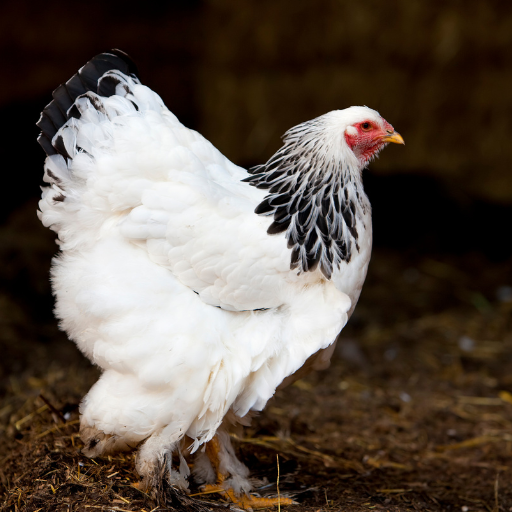
The dominant component of chicken manure is feces, which is known for its high nutrient content, especially nitrogen, phosphorus, and potassium (N-P-K). Macronutrients are necessary for plant growth processes including photosynthesis, root proliferation, flower production and fruiting. Moreover, there are also trace elements and organic matter in chicken manure which help to fortify the soil structure and improve water retention capacity. Chicken manure application stimulates microbial activity that breaks down organic materials into available forms of plant nutrients in the soil. Turning waste into valuable fertilizer; it supports a sustainable garden practice thus reducing reliance on chemical fertilizers.
Understanding the Basics of Chicken Manure
Chicken manure is a powerful natural fertilizer mainly because it contains high amounts of nitrogen (N), phosphorus (P) and potassium (K). The N:P:K ratio of chicken manure ranges from 1.1-1.7: 0.8-1.2: 0.5-0.9 depending on what type of bedding was used and what food the chickens were consuming. Nitrogen facilitates leafy green growth while phosphorous aids in root development as well as flowering while potassium enhances overall plant vigor and resistance against diseases. Also present in chicken dung are micronutrients such as calcium, magnesium, sulfur that contribute to balanced nutrition for plants as well as healthy soils.
Chicken dung gives better soil texture by improving aeration and water-holding capacity due to a lot of living microorganisms within it, among other reasons. As a result, fertile soils release useful plant nutrients through mineralization where organic constituents are decomposed into forms usable by plants with participation from microbes concerned with decomposition processes . Besides growing gardens these beneficial organisms can manage several undesirable pathogens related to the earth’s surface hence making an area flourish through favorable situation provision because composting poultry litter comprises eco-friendly activities thereby utilizing organic wastes instead hazardous fertilizers like synthetic ones.
Nutrient Content in Poultry Manure
Poultry manure is well known for its high nutrient concentrations including a balanced mix of essential macronutrients and micronutrients required for plant growth and soil health. Nitrogen (N) levels are usually between 1.1 to 1.7%, phosphorus (P) ranges from 0.8% to 1.2%, while potassium (K) varies from 0.5% up to 0.9%. Moreover, there are also minerals such as calcium, magnesium, and sulfur, which are very important for poultry waste management . In summary, these elements collectively lead to enhanced soil structure, improved microbial activities and boosted disease resistance in plants hence making the use of poultry litter a sustainable choice as an ecological fertilizer.
Why Chicken Manure is a Great Choice for Fertilizer
Chicken droppings make good fertilizers due to their high nutritional value as well as their positive effect on soil fertility. The higher concentration of nitrogen, phosphorus and potassium can be very beneficial for healthy growth of plants sowed into this fertilizer . It is found that nitrogen contents in chicken dung range from 1.1-1.7 % that supports foliar development; phosphorous content between the range of 0.8-1.2 % encourages root growth and flowering while potassium content of between 0.5-0.9% enhances stress tolerance and water holding capacity by plants.
Other minerals can be found in chicken droppings which include sulphur, magnesium and calcium making it an essential source of balanced plant nutrition and means to improve soil structure. Additionally, this manure has a high content of organic matter that improves the richness of carbon for the soil, hence supporting beneficial microorganisms. Such organisms helps in decomposition as they convert organic matter into humus, thus enhancing air circulation and water retention capacity within soils while simultaneously suppressing the growth of soil-borne illnesses. Research indicates that when chicken litter is used, there is an increase in levels of organic carbon by 30% which results in significant improvement on both soil fertility and structure (Khanal et al., 2007). Furthermore, including chicken manure during gardening reduces dependency on manufactured chemicals for fertilization, leading to a sustainable agricultural system approach.
How to Safely Use Chicken Manure in Your Garden?
Start using chicken manure safely in the garden by composting it properly as fresh chicken manure might be too strong and can harm your plants. Composting for at least six months reduces risk of pathogens and levels of nitrogen and hence avoiding root burns from high nitrogen levels. After composting, it can be added to the soil in November to allow it to further break down during the winter season. When applying chicken manure, ensure it is well mixed with soil lest there are nutrient imbalances. It is recommended that gloves be worn and hands washed after handling manure so that the risk of contamination will be reduced. Also, avoid putting directly on plants while growing as this can cause burns on foliage.
Steps towards Rightly Composting Chicken Manure
- Collect Fresh Manure and Bedding Material: Begin by collecting newly produced or excreted droppings from chickens, then combine these with bedding materials like straw or sawdust. Combining these elements helps maintain a balanced carbon-nitrogen ratio, which is crucial for effective decomposition.
- Create a Compost Pile or Bin: Locate an area with proper drainage where you could either create a compost pile outside or use a compost bin; both options work fine. The pile should be large enough to retain heat during decomposition—for instance, three feet tall by three feet wide would be ideal.
- Layer Organic Materials: Alternate between layers of chicken feces and high-carbon organic matter such as leaves, grass clippings, or kitchen waste scraps; this method introduces air into the system, thus enhancing microbial breakdown.
- Moisture Management: Keep water flowing through your compost but do not overwater it. The material should not feel wet or dry but rather like a damp sponge. There should always be enough moisture content for bacteria and other microorganisms while also minimizing waterlogged situations.
- Turn the Pile Regularly: Turning the compost pile occasionally brings in more oxygen, thus accelerating the decomposition process; furthermore, regular turning of the heap helps avoid anaerobic conditions that lead to bad smells.
- Monitor Temperature: For several days, keep the inside temperature between 130°F and 150°F to kill pathogens and weed seeds. Maintain this temperature range using a compost thermometer, adjusting composting materials as needed.
- Compost Maturity Test: Once the active composting phase is over, allow for a few months’ curing period before mature compost is obtained. Mature compost should be dark brown, crumbly and have an earthy aroma. A germination test can also be conducted to determine whether or not it’s ready for use.
- Application to Garden: After full decomposition has taken place, apply chicken manure compost to your garden soil before planting time. This ensures proper nutrient integration into the soil and avoids nutrient burn; hence, it should be worked well into the soil before planting time.
Comprehending the Hazards Associated with Pathogens in Fresh Chicken Manure
Different types of pathogens can be present in fresh chicken manure that can pose substantial risks to human health and garden crops. Notable among these are Salmonella, Campylobacter, and E. coli which are often found in poultry waste. These bacteria may cause contamination of vegetables and fruits if fresh manure is used directly without composting onto vegetable beds. The pathogens survive for long periods especially in cool, wet environments hence it is important to properly compost manure at high temperatures so as to kill them off. Furthermore, handling fresh manure may result in respiratory infections or gastrointestinal illnesses; thus, people must wear protective gear and wash their hands thoroughly after every contact. By closely monitoring the composting process and properly managing manure, the risk associated with pathogenic organisms can be highly reduced.
Directions for Aging Manures Before Application
- Time plus temperature: Allow the outdoor compost pile decompose for a minimum of six months. Within this duration, the pile should attain internal temperatures ranging from 131°F-160°F (55°C-71°C) which are necessary for killing pathogens.
- Moisture Management: Maintain sufficient moisture between 40% – 60% in the heap of organic materials meant to produce compost material. Correct humidity levels will help boost microbial activity needed to break down organic matter mixing nutrients.
- Aeration: Turn over the heap regularly to ensure a sufficient supply of oxygen. Airing helps keep aerobic conditions critical for good decomposition and undesirable smell reduction; thus, the recommended turning interval is two to three weeks.
- Carbon-to-nitrogen ratio: We must achieve an optimum C:N ratio by incorporating carbonaceous materials into chicken wastes such as straw, leaves, or woodchips, whereby a C:N ratio should range from 25:1 to 30:1. This is necessary for the quick decomposition and increased quality of compost.
- pH Monitoring: Ideally, the compost pile’s pH should remain between 6.5 and 8.0. Extremes of acidity or alkalinity may inhibit microbial activity and nutrient availability.
What are the Benefits of Chicken Manure for Your Garden?
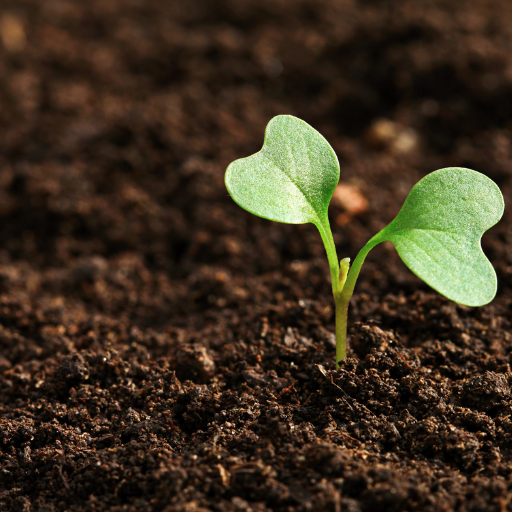
Chicken poop is a fantastic natural fertilizer with many advantages for the garden. This contains very important nutrients like nitrogen, phosphorus and potassium which are vital in plant growth. The huge content of nitrogen supports leafy green’s fast vegetative growth. Moreover, chicken manure has phosphorus that helps root development and flowering, while potassium enhances the overall health of plants and disease resistance. Apart from nutrient composition, it also improves soil structure through an increase in organic matter, increasing its water-holding capacity and airiness, thus leading to enhanced root formation and resilience of the garden ecosystem. In addition to this, chicken manure introduces microorganisms into the soil, which are useful in fostering a healthy microbial environment necessary for nutrient cycling and promoting the good health of plants.
Improving Soil with Organic Matter
Soil organic matter significantly affects soil health by improving soil structure, fertility and microbial activity. Examples include decomposed plant residues or animal waste products, which increase both soil moisture holding capacity and nutrient retention ability, hence improving general plant performance. According to most sources, ideal topsoil has about 5-8% organic matter content. These can be increased gradually by incorporating organic materials such as composts, manures or cover crops to make the texture better textured with time. For instance, once well composted, it ensures slow release of essential nutrients, while legume-based cover crops lead to the addition of more fertility through the fixation of nitrogen into the soil without using any synthetic inputs.Thus maintaining recommended levels for soil organic matter promotes proliferation of beneficial microbes which hastens breakdown/release nutrients from dead bodies.This mutualistic relationship encourages stronger root systems, leading to more aerated soils and activation of disease suppression mechanisms, ultimately thus causing productive and sustainable gardens.
Enhancing Nutrient Content and Soil Fertility
It is worth noting that chicken manure is among the best choices if you’re looking for a highly effective organic fertilizer. These are major plant nutrients and therefore a good manure that can improve soil fertility. Compared to other manures, chicken manure has higher amounts of these elements making it more beneficial for the plants. In addition, chicken manure has organic content thereby improving water holding capacity, structure as well as microbial activity in the soils. Composted chicken manure will have balanced nutrient availability hence reducing nutrient leaching and potential pathogen contamination thus giving a safe additive to garden soils.
Long-term Soil Amendment Effects
Chicken dung application as a long term soil amendment is multifaceted since it improves soil health and crop productivity. Regularly applying properly composted chicken dung enriches the organic matter content of the soil leading to an enhanced soil structure and better water retention. This, in turn, ensures adequate minerals are needed for the growth of root systems and the sustenance of plants. Chicken poop also promotes the breeding of useful microorganisms, which create a complex ecosystem within the soil that supports decomposition activities on organic substances, cycling nutrients, among other things. Consequently, such benefits accumulate over time, resulting in soils that are less vulnerable to erosion and compaction eventually. Furthermore, this continuous supply of nutrients from chicken excreta serves to reduce reliance on chemical fertilizers thereby promoting sustainable agriculture practices
When and How to Apply Chicken Manure?
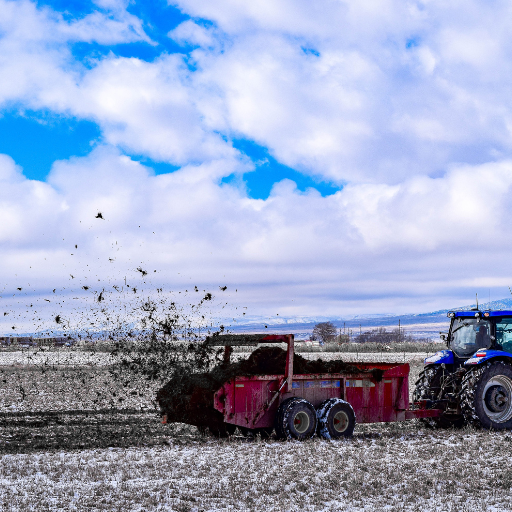
For best results, chicken manure should be applied during the fall or early spring with sufficient time for decomposition and integration into soil before planting. Before use, it is important to ensure that manure is carefully composted to kill any pathogens and reduce the volatilization of nitrogen. Composted manure should be evenly spread across the soil surface with a spade or rototiller to incorporate it into top 6-8 inches of soil. When applying on established plants, place it around their bases while avoiding direct contact with stems and leaves to avoid burning. About 40 pounds per every 100 square feet of garden area or 1-2 inches worked into the ground generally serve as a recommended application rate. Regularly checking soil pH and nutrient status is advised for optimum growing conditions.
Optimal Timing for Applying Chicken Manure
The optimal timing for applying chicken manure depends mainly on climate type, nature of soils and specific crop requirements. In most areas fall or early spring applications are more commonly suggested for chicken manures. That gives enough time for decaying and merging with soils before the next growing season starts. For instance, it helps chicken droppings break down during winter months which do not allow this process due to cold winters. Therefore when used in spring its decomposition has to be fast so that nutrients will have been readily available at planting.
It is imperative that a balance between carbon and nitrogen (C:N) ratio in composted chicken manure be maintained within technical parameters; usually aiming at about 25:1 – 30:1 range. Besides ensuring that these droppings are properly decayed, they need not contain pathogenic microorganisms nor have their proteins escaped by ammonia fumes because such losses can occur during nitrification stages in the soil . Turning over materials frequently hastens breaking up so much that moisture levels should remain around fifty percent (50%) to sixty percent (60%).
Similarly, temperature is a major concern in composting process. During manure composting, the internal temperatures should reach 130°F to 160°F to ensure that all pathogens and weed seeds are killed off. These parameters must be adjusted appropriately so as not only to enhance efficacy but also safety associated with the applied manure. In most garden soils, chicken manure should be used at a rate of approximately 40 pounds per square feet although this can vary depending on specific crop nutrient needs and soil fertility background. To customize your garden or farm’s requirements for amount and timing of applying chicken manure, it is important that you take regular soil tests.
Methods to Use Chicken Manure in Different Plant Stages
Seedling Stage: Apply chicken manure sparingly during the seedling stage to avoid nutrient burn, which may harm young plants. One part composted manure can be mixed with every four parts potting soil and then added to the seedling mix. The main aim here is not overloading weak roots but instead gently providing some nutrition.
Vegetative Stage: Plants become more nutrient-demanding during the vegetative growth stage. For better soil fertility, chicken manure should be incorporated into the soil 6 inches deep by tilling it in. This will facilitate the even distribution of the manure at approximately a rate of 20 pounds per 100 square feet. Consistent watering helps in the gradual release of nutrients for healthy plant development.
Flowering and Fruiting Stage: For proper development during flowering and fruiting phase, additional phosphorus as well as potassium are required by plants. During this time applying some chicken manure can help solve these deficiencies. A side dressing rate of 10 pounds per 100 square feet placed around 6 inches away from the plant’s base will prevent nutrient burn while meeting plant nutrition needs. Moreover, incorporation of such manure into top two inches of soil prevents nutrient volatilization and enhances uptake efficiency.
Dos and Don’ts for a Vegetable Garden Using Chicken Manure
Dos:
- Compost it well: Composted chicken manure is less prone to burning plants and more readily available for use by roots; thus reducing pathogenic exposure risk.
- Test your soil: Soil testing on regular basis can determine how much chicken manure you need to apply according to your soil nutrient requirement.
- Apply manure at the right time: When applying chicken manure, do this some weeks prior to planting to allow full integration of nutrients and reduce chances of leaching.
- Use protective gears: Wear gloves & masks when handling chicken droppings to prevent respiratory irritants or pathogens infection.
Don’ts:
- Don’t directly use fresh ones from the poultry house: Fresh chicken droppings contain a lot of nitrogen, which can burn crops. They also harbor disease-causing agents that may contaminate food products.
- Do not overuse them; extra quantities can result in nutrient imbalances, runoff, and pollution of nearby water bodies.
- Avoid applying chicken droppings close to harvest time: This is because it can lead to contamination of edible parts of plants respectively. As a result, don’t put them for 90 days before the end of crops that do not touch the ground and let’s say 120 days before the end for vegetables that do.
- Do not forget about regular watering: Presence of adequate moisture levels in soil helps in gradual release of nutrients from manure therefore maintaining steady nutrition supply to plants.
Can You Use Fresh Chicken Manure?
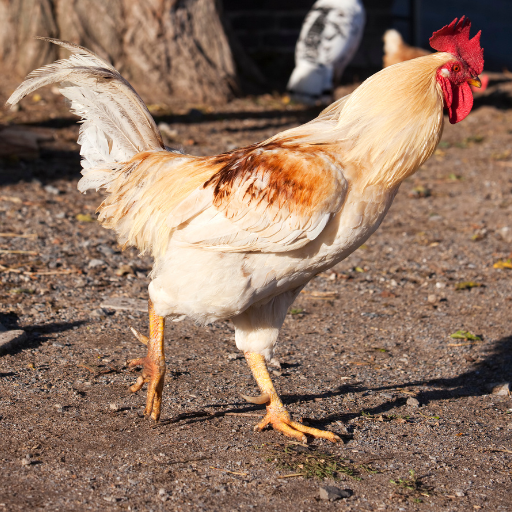
Using fresh chicken manure in the vegetable garden is generally not advisable due to its high nitrogen levels and potential pathogens. Roots and stems of plants can be burned by fresh manures, thereby causing damage and reducing growth. Fresh chicken manures also are the main sources of Salmonella spp., E. coli, among other pathogenic bacteria that can infect crops and possibly lead to health hazards in humans.Consequently, chicken manure should be composted properly before its application; this way, most of the harmful pathogens will have been eliminated and nitrogen levels reduced making it more suitable for plant nutrition.
Pros & Cons of Raw Manure
Fresh poultry droppings have their own advantages, including being a natural fertilizer that is very rich with a lot of nitrogen (N), phosphorous (P), and potassium (K) – essential elements that make plants grow. Fresh chicken manure has a relatively higher nitrogen content of between 1.5% and 2.4%, thus making it an effective agent for rapidly improving vegetation and inducing greening. Furthermore, untreated organic fertilizers help improve soil texture, increase water-holding capacity, and promote beneficial microbial activity.
Despite these merits, caution should be taken when using raw manure as some disadvantages come along with fresh chicken excreta mainly because they contain ammonia in excess amounts than what’s healthy meaning if applied on top like this it would burn tissues away from plant life. Besides this fact as well, unrefined feces carries pathogens like E.coli or Salmonella typhi which imposes serious threats on peoples’ lives when used without prior treatment.“This could result to nutrient imbalance or environmental pollution such as runoff into water bodies.” This is usually caused by over utilization of nutrients resulting from excessive input applications thus creating conditions favoring loss through leaching.
Composting then considerably reduces these risks through a stabilization process involving heat generated due to the presence of nitrogen in the composted chicken manure. Nonetheless, to take advantage of its advantages, raw fecal matter must be properly processed for it to be safely utilized in agricultural settings.
Raw Chicken Manure vs Composted Manure
To determine the best option for use in agriculture, a number of factors should be weighed when comparing raw chicken manure and composted manure.
- Nutrient Availability and Stability:
-
- Raw Chicken Manure contains high levels of readily available nitrogen (approximately 1.5-2.4%), phosphorous, and potassium, which may stimulate fast growth in plants; however, too much nitrogen can lead to nitrogen burns.
- Composted Manure: Stable nitrogen releases nutrients slowly throughout the season while also making essential elements available after decomposition thus reducing instances where plants are affected by burning due to excessive presence of such substances. On average, composted manures have slightly lower nutrient levels but are also more balanced with about 1.0-2.0% N; up to 2.0% P; and 1.5% K available.
- Pathogen Control:
-
- Raw Chicken Manure: Might contain pathogens like Salmonella and E.coli that can cause health problems for humans or animals if not properly treated.
- Composted Manure: Aerobic composting processes generate high temperatures (above 131°F or 55°C) for extended periods, effectively killing most harmful pathogens and making the manure safer for use.
- Soil and Environmental Impact:
-
- Raw Chicken Manure: The high levels of nutrients, especially nitrogen (N) and phosphorous (P), when not managed properly can lead to environmental issues such as water pollution through runoff.Actually, these unprocessed organic fertilizers result in soil imbalance, thus depleting it over time.
- Composted Manure improves soil structure through an increase in organic matter, retention of water, and establishment of a friendly microbial environment. Its steady nutrient supply is good when it comes to controlling loss through leaching and pollution otherwise associated with high rates of fertilizers.
To summarize, although fresh manure from chickens may offer immediate nutrition to plants and have an effect of rapid growth, risks such as presence of pathogens, chances of nutrient burning, and other potential environmental hazards make composted manure a better option. The process of composting not only stabilizes the nutrients but also mitigates health risks and enhances long-term soil fertility.
How Does Chicken Coop Maintenance Affect Manure Quality?
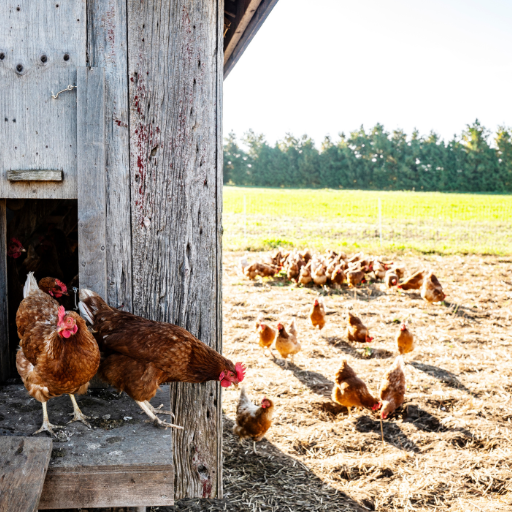
Quality of manure obtained in a chicken can be highly influenced by proper coop maintenance. First, hygiene reduces excessive moisture retention that would otherwise make the poultry’s excreta lose its dryness. Frequent litter changing is important to ascertain that it remains dry, for this will provide normal conditions for both hens and fertilizers. Secondly, using sufficient ventilation within the poultry house, ammonia concentration can be reduced thus safeguarding manure from being excessively stinking and chickens from having respiratory problems. At last but not least, rotating the area where chicken live periodically can break down contamination levels and spread waste evenly, improving nutrient profile and composting potential in manure generally. In conclusion, appropriate practices combined with routine maintenance result into improved quality of manure and enhanced welfare of birds.
Impact on Manure Quality from Bedding Material
Different litter material impacts the quality of manure derived from poultry houses. The materials include straw, wood shavings or chips as well as sawdust each comes with different abilities i.e., absorbing any wetness there could be left in the process and controlling smells and supporting decomposition respectively. Straw is quite efficient in this exercise due to its high water absorption capacity, thus decomposing quickly and forming organic matter that is useful in composting. For example, wood shavings absorb less than straw but still have good ventilation properties which facilitate faster breakdown in compost formation stage whereby they help in maintaining pit air spaces less compacted by fecal remnants while constantly allowing passage of air through their depth easily channeled into soil structures adjacent to them. Sawdust is another type, but its small particle size makes it possible to compact, therefore reducing aeration. However, it has a much higher ability to take up liquids like urine, including other solutions, comparatively better than any other kind of litter, hence making it best suited for deep brooder beds. The choice of bedding material and its management are directly related to the moisture content, aeration and general microbial activity within the compost, which determine soil amendment value in terms of nutrient balance.
Best Practices for Managing Poultry Litter
Effective poultry litter management involves several practices to keep litter at optimal conditions for bird health and acceptable manure quality. In this regard, good ventilation in the house is necessary to control humidity but not allow the moisture content of the litter to rise too much because this could cause the growth of harmful bacteria and fungi. Additionally, an ideal depth of three to four inches ensures enough cushioning without causing compaction or excess accumulation of manure.
Furthermore, maintaining proper nitrogen-to-carbon ratio in litter by occasionally adding carbon-rich materials like straw or wood shavings can help improve composting efficiency and nutrient levels. Proper disposal methods should be implemented regarding soiled bedding as it may contain ammonia gas or other toxic elements. As such, biweekly turning helps increase air circulation between your feet while breaking down organic matter minimizing odors and moistures.
Footbaths, along with appropriate clothing such as overalls, are recommended since they help reduce the chances of disease transmission into houses. These best practice approaches aid in keeping healthy birds along with productive ones, hence ensuring manure quality that supports soil fertility, increasing productivity on farms during crop cultivation activities, and making them an important input in the agricultural production system.
The Role of Composting Process in Manure Preparation
The composting process is crucial in manure preparation as it changes raw manure into a stable and enriched organic product that is good for use in agriculture. When composting occurs, the microorganisms break down the organic matter, drastically reducing its volume and pathogen contents. Moreover, these nutrients are stabilized after the process making them more easily taken up by plants. Efficient composting entails observing ideal conditions such as aeration adequacy, moisture levels and temperature control for microbial operations. A nutrient rich compost devoid of pathogens which improves soil structure with better water-holding capacity and adding important plant nutrition for sustainable agriculture results from this innovation.
Reference sources
- The Spruce
- Source: Chicken Manure Fertilizer
- Summary: This article discusses the high nitrogen and phosphorus content of chicken manure, making it superior to other farm manures like cow manure. It explains how chicken manure can be an effective organic fertilizer for gardens.
- University of Nevada, Reno – Extension
- Source: Using Chicken Manure Safely in Home Gardens
- Summary: The publication details the nutrient-rich composition of chicken manure, including its high levels of nitrogen, potassium, phosphorus, and calcium. It also provides guidelines on how to safely use chicken manure as organic fertilizer.
- Gardening Know How
- Source: Chicken Manure For Vegetable Garden Fertilization
- Summary: This resource describes the benefits of using chicken manure compost in vegetable gardens. It emphasizes the high nitrogen content and the importance of composting the manure before application to prevent plant damage.
Frequently Asked Questions (FAQs)
Q: What are the benefits of using chicken manure fertilizer in organic gardens?
A: Chicken manure fertilizer is an excellent source of nutrients, including nitrogen, phosphorus, and potassium. It enhances soil structure, improves aeration, and promotes the growth of beneficial microbes. This organic material also enriches garden soil with essential micronutrients, making it ideal for home gardens.
Q: How should fresh manure be treated before using it as garden fertilizer?
A: Fresh manure should be composted or aged before use to prevent it from burning plants and to eliminate potential pathogens. Composting in a dedicated compost pile helps to break down harmful components, making chicken manure safe for garden application.
Q: Is fresh poultry manure safe to use directly in the garden?
A: No, fresh poultry manure is not safe to use directly because it can burn plants and may contain harmful pathogens. Always use aged chicken manure or dried manure to provide nutrients safely to your plants.
Q: How often should I fertilize my garden with chicken manure compost?
A: It depends on the specific needs of your garden, but generally, you can fertilize your garden with chicken manure compost once or twice a year. This ensures that your soil receives a steady supply of nutrients without overwhelming your plants.
Q: Can chicken manure be used on all types of vegetables?
A: Yes, chicken manure can be used on a wide variety of vegetables, including nutrient-hungry plants like cucumbers. However, make sure to apply it appropriately to avoid nitrogen burn and to ensure balanced nutrient supply for all your garden crops.
Q: What precautions should be taken when using chicken manure as a garden fertilizer?
A: When using chicken manure, ensure it is fully composted or aged to kill any harmful pathogens and reduce the risk of nitrogen burn. Avoid over-application and always mix it well into the soil to improve drainage and aeration.
Q: Can chicken manure be mixed with other types of manure?
A: Yes, chicken manure can be mixed with other types of manure, like cow manure, to create a balanced garden fertilizer. This combination can provide a wider range of nutrients and benefits to the soil and plants.
Q: How long does it take for chicken manure to compost fully?
A: Composting chicken manure typically takes between 6 to 12 months, depending on factors like pile size, turning frequency, and climate conditions. Properly composted chicken manure will be dark, crumbly, and free of strong odors, indicating it’s ready for use in your garden.
Q: What are the signs that chicken droppings have been composted properly?
A: Properly composted chicken droppings will have a uniform dark color, a crumbly texture, and a pleasant earthy smell. They should also no longer contain recognizable bits of fresh manure or food scraps, indicating they are safe to use as an organic fertilizer.






